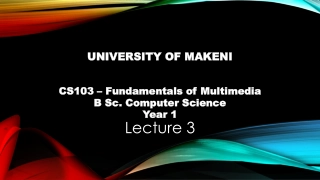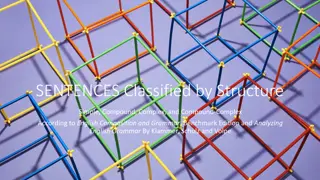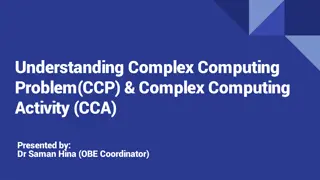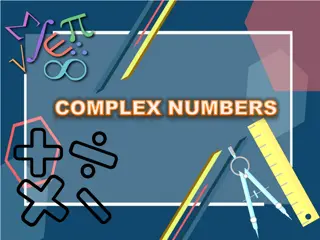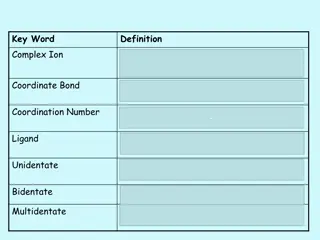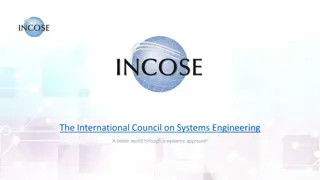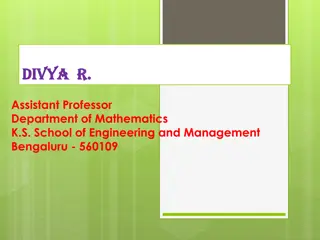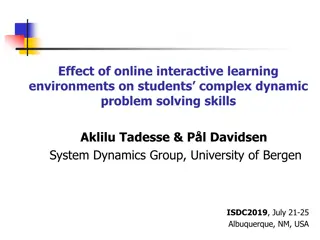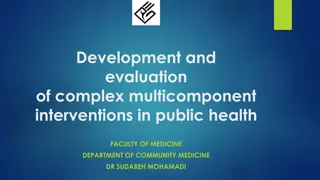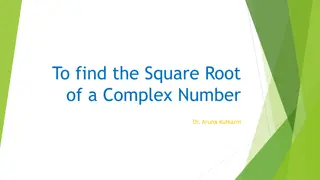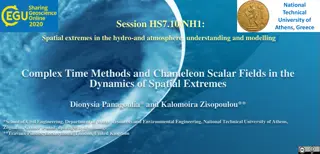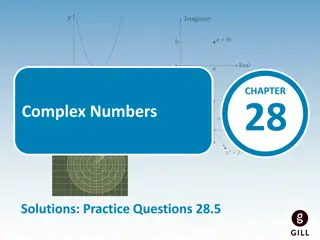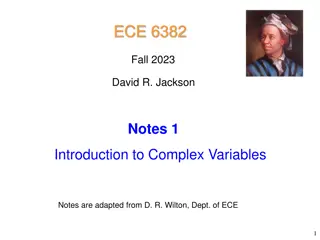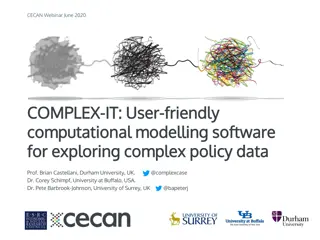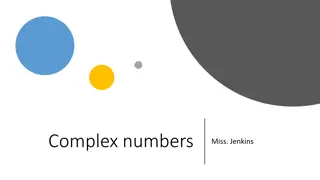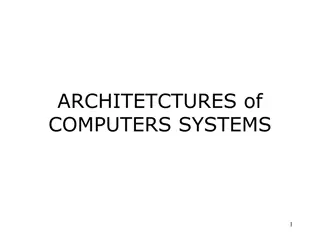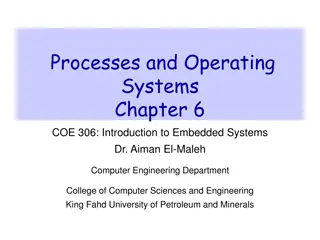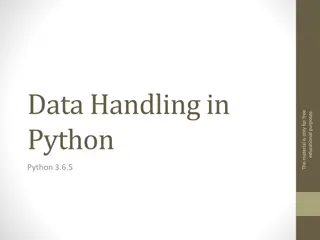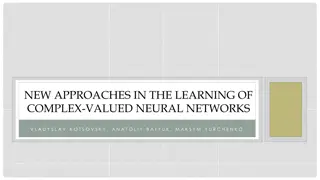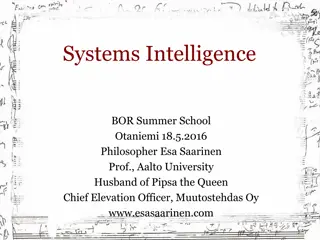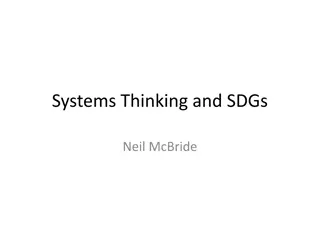Understanding Multimedia Systems: Hardware and Software Components
Multimedia systems require specific hardware and software components to meet the demands of producing and playing multimedia content. Development systems are used for creating content with higher specifications, while playback systems are used for playing multimedia files with lower specifications.
8 views • 46 slides
National Network for Complex Chronic Conditions in Pediatrics
The Red Nacional de Condiciones Crónicas Complejas en Pediatría is focused on integrating services for children with special health needs, including those with complex chronic conditions. It aims to strengthen provincial healthcare systems by providing specialized care and support for children at
7 views • 30 slides
Overview of Distributed Systems: Characteristics, Classification, Computation, Communication, and Fault Models
Characterizing Distributed Systems: Multiple autonomous computers with CPUs, memory, storage, and I/O paths, interconnected geographically, shared state, global invariants. Classifying Distributed Systems: Based on synchrony, communication medium, fault models like crash and Byzantine failures. Comp
9 views • 126 slides
Understanding Complex Numbers and Functions in Mathematics
Explore the concept of complex numbers, their operations like addition, subtraction, and multiplication, as well as De Moivre's theorem for raising complex numbers to powers. Dive into solving problems using complex numbers and understanding functions, algebra, and the remainder and factor theorems
12 views • 45 slides
Understanding Information Systems in Organizational Management
Management in organizations is divided into three levels: operational, tactical, and strategic. Each level requires different information systems to support various activities. Operational systems focus on routine transactions and control processes, while middle-level systems aid in semi-structured
9 views • 39 slides
The Top Benefits of Swimming Class At Tampines Swimming Complex
The Tampines Swimming Complex, in the heart of Our Tampines Hub in Singapore, provides a world-class aquatic surrounding for swimmers of all ages and abilities. Beyond recreational swimming, the complex is most known for its outstanding Swimming class at Tampines with Ace Dolphin Swim School. Whethe
0 views • 3 slides
The Origin of Viruses: Theories and Evidence
Viruses are acellular parasites with a complex replication mechanism. Studies on their origin present challenges due to the lack of fossils. Three main hypotheses include regressive, cellular origin, and co-evolution. The regressive hypothesis suggests viruses originated from complex ancestors that
2 views • 25 slides
Sentence Structures: Simple, Compound, Complex, and Compound-Complex
Learn about the different types of sentence structures - simple, compound, complex, and compound-complex - through examples and definitions. Understand the components of clauses and sentences, including independent and dependent clauses, to enhance your understanding of English grammar.
2 views • 11 slides
Understanding Different Types of Recommender Systems
Recommender systems play a crucial role in providing personalized recommendations to users. This article delves into various types of recommender systems including Collaborative Filtering, Content-Based, Knowledge-Based, and Group Recommender Systems. Collaborative Filtering involves making predicti
0 views • 7 slides
Overview of Lipids: Classification and Biological Importance
Lipids are organic substances that play a crucial role in biological systems. They include simple lipids, complex lipids like phospholipids and glycolipids, and derived lipids. Simple lipids are esters of fatty acids with various alcohols, while complex lipids are sub-classified based on the type of
2 views • 38 slides
Introduction to Embedded Systems Design
Embedded Systems Design, Chapter 1 provides an insightful overview of embedded systems, distinguishing them from general-purpose computers. The chapter delves into the characteristics of embedded systems, their design considerations, and the various types of embedded computers such as general-purpos
1 views • 7 slides
Understanding Complex Computing Problem (CCP) and Complex Computing Activity (CCA)
Dr. Saman Hina, along with Dr. Farrukh Arif and Dr. Maria Waqas, presents information on Complex Computing Problem (CCP) - a problem involving technical, computing, and other issues with no obvious solution, requiring deep knowledge and analytical thinking. CCP is evaluated through predefined rubric
4 views • 19 slides
Comprehensive Guide to Complex Numbers - Learning Objectives, Key Concepts, and Previous Knowledge Testing
This comprehensive guide provides detailed information on complex numbers, including learning objectives such as identifying complex numbers, applying algebra, understanding properties like conjugates and moduli, finding square roots, and representing in polar form. Key concepts covered include inte
3 views • 27 slides
Understanding Complex Ions and Coordinate Bonds in Chemistry
Complex ions in chemistry are formed when transition metals or their ions bond with ligands through coordinate bonds. Ligands utilize their lone pairs of electrons to form dative covalent bonds with transition metals, determining the coordination number of the cation. Complex ions play a crucial rol
1 views • 29 slides
International Council on Systems Engineering (INCOSE) - Empowering Systems Engineers
INCOSE is dedicated to promoting successful systems engineering practices worldwide. Systems engineers play a critical role in designing and managing complex systems, ensuring efficiency and innovation. Through a comprehensive approach, INCOSE aims to address societal and technical challenges, drivi
0 views • 30 slides
Understanding Wicked Problems and Systems Thinking
Change is challenging, especially within complex systems. To address wicked problems effectively, we must embrace systems thinking, which offers a holistic view to tackle interconnected issues. Systems thinking requires shifts in perspective and encourages a deeper understanding of system structures
0 views • 9 slides
Assistant Professor Divya R. - Complex Analysis and Probability Course Overview
Assistant Professor Divya R. from the Department of Mathematics at K.S. School of Engineering and Management in Bengaluru presents a course on Complex Analysis and Probability. The course covers topics such as functions of complex variables, Cauchy-Riemann equations, properties of analytic functions
0 views • 27 slides
Enhancing Complex Dynamic Problem-Solving Skills Through Online Interactive Learning Environments
Explore the impact of online interactive learning environments on students' ability to solve complex dynamic problems, illustrated through the case study of Mr. Wang's bicycle repair shop in Shanghai. Discover the challenges faced by learners in understanding and managing complex systems, and how th
0 views • 15 slides
Development and Evaluation of Complex Multicomponent Interventions in Public Health
A key concern in public health initiatives is the lack of emphasis on evaluation during implementation. Rushed introductions of new initiatives without adequate development lead to replacements before effectiveness is determined. Collaborative efforts between researchers and practitioners are crucia
0 views • 84 slides
Finding Square Roots of Complex Numbers
Dr. Aruna Kulkarni explains the process of finding the square root of a complex number using equations for real and imaginary parts. By solving the equations step by step, the square roots of the complex number are determined. The final result is presented, showcasing the values of a and b in the co
0 views • 5 slides
Understanding Spatial Extremes: Complex Time Methods in Hydro-Atmospheric Dynamics
This study explores the use of complex time methods and chameleon scalar fields in understanding and modeling spatial extremes in hydrological and atmospheric systems. By transforming Lagrangian processes and introducing chameleon scalar fields, the research unveils new insights into the mechanism g
0 views • 9 slides
Information Systems in Organizations: Overview and Implementation
Information systems play a crucial role in organizations, encompassing transaction processing systems, functional area information systems, and enterprise resource planning systems. This content delves into the purpose of transaction processing systems, the support provided by information systems ac
0 views • 30 slides
Practice Questions on Complex Numbers Solutions
This set of practice questions focuses on complex numbers, including finding conjugates, adding, subtracting, and multiplying complex numbers. It also investigates the truth of statements involving operations with given complex numbers.
0 views • 37 slides
Understanding Complex Numbers in Mathematics
Learn about complex numbers, including real and imaginary parts, operations with complex numbers, the imaginary unit, equality of complex numbers, and finding square roots of negative numbers. Explore how to define and use the imaginary unit, add, subtract, and multiply complex numbers, find complex
0 views • 17 slides
Complex Variables: Introduction to Arithmetic and Algebra
Complex variables play a crucial role in physics and engineering, offering a powerful tool for analysis and problem-solving. This content explores the basics of complex arithmetic and algebra, including operations like addition, subtraction, multiplication, and division. Understanding complex number
0 views • 13 slides
Introduction to COMPLEX-IT: A User-Friendly Computational Modelling Software for Policy Data Exploration
Explore the capabilities of COMPLEX-IT, a web-based software tool designed to enhance researchers' access to computational social science tools. It offers a compact platform integrating case-based modelling, artificial intelligence, scenario analysis, and more. With an intuitive interface and quick
0 views • 14 slides
COMPLEX ANALYSIS
Complex analysis explores the properties and behavior of complex functions and numbers. Topics covered include functions of complex variables, limits, continuity, and differentiability. Understanding concepts like the Cauchy-Riemann equation is crucial in studying complex valued functions. This fiel
0 views • 9 slides
Exploring Complex Numbers in Mathematics
Delve into the world of complex numbers through solving quadratic equations with real coefficients that have complex solutions, extending polynomial identities to include factoring with complex numbers, rewriting expressions, and understanding imaginary numbers. Discover the process of finding compl
0 views • 16 slides
Navigating the Middle Tier Complex Lending Landscape in the Mortgage Market
Between high-street, specialist lending, and complex cases lies a middle tier in the mortgage market. Complex lending is crucial, with key areas for lenders to focus on. Exploring the benefits of self- and custom-build options, understanding the self-build market, and seizing opportunities for growt
0 views • 5 slides
Managing Complexity in Health & Care Systems
Addressing the challenges of complexity in health and care systems, this content delves into embracing complexity, working in complex environments, and understanding the emergent nature of complex systems. It highlights the importance of being human, continuous learning, and nurturing healthy system
0 views • 28 slides
Understanding Computer Systems Architectures and Standards
Open systems, standards, client-server models, and internet functionality are crucial components of computer systems architectures. Open systems promote interoperability, standards ensure technical criteria, client-server models define coordination, and the internet provides a communication infrastr
0 views • 34 slides
Mastering Complex Reflections in Motivational Interviewing
Bill Miller, co-creator of Motivational Interviewing, emphasizes the importance of reflections in MI, highlighting Simple Reflections and Complex Reflections. Complex Reflections, such as CARVED HAM and VERDACHAM, offer deeper insights by going beyond what is said to provide new perspectives and enh
0 views • 5 slides
Introduction to Processes and Operating Systems in Embedded Systems
Processes and operating systems play a crucial role in building complex applications on microprocessors, offering flexibility to meet timing requirements. The operating system (OS) manages processes by providing mechanisms for switching execution between them. Real-Time Operating Systems (RTOS) are
0 views • 65 slides
Understanding Embedded Systems and Cyber-Physical Systems
Embedded systems are specialized computer systems embedded within larger systems, such as control systems and car controllers. This lecture covers real-time aspects, applications of Cyber-Physical Systems (CPS), and examples like the Boeing 777/Airbus A380 cockpit. It discusses the design process of
0 views • 22 slides
Understanding Complex Lipids: Glycerophospholipids and Sphingolipids
Complex lipids play crucial roles in cellular structure and function. Glycerophospholipids, such as phosphatidylcholine, are amphipathic molecules with hydrophobic fatty acid chains and hydrophilic head groups. They are key components of cell membranes. Sphingolipids, including sphingomyelin and cer
2 views • 95 slides
Understanding Data Handling in Python
Types of data in Python include Number, String, List, Tuple, Set, and Dictionary. Python supports integers, floating point numbers, and complex numbers with the classes int, float, and complex. Different number systems like binary, hexadecimal, and octal are also supported. Type conversion in Python
0 views • 49 slides
New Approaches in Learning Complex-Valued Neural Networks
This study explores innovative methods in training complex-valued neural networks, including a model of complex-valued neurons, network architecture, error analysis, Adam optimizer, gradient calculation, and activation function selection. Simulation results compare real-valued and complex-valued net
0 views • 12 slides
Systems Thinking in Pandemic Preparedness and Response
This topic focuses on the application of systems thinking in pandemic preparedness and response. It explores the inter-relationships among system elements to influence outcomes in complex, unpredictable environments. Learners will develop competencies in understanding complex problems, creating solu
0 views • 34 slides
Systems Intelligence: Enhancing Intelligent Behavior in Complex Systems
Explore the concept of Systems Intelligence, focusing on intelligent behavior within complex systems through interaction and feedback. This approach emphasizes understanding the interdependency of individuals within a larger system, enabling intelligent actions and decision-making. Delve into practi
0 views • 21 slides
Understanding Systems Thinking and its Applications in Sustainable Development Goals
Systems thinking is an approach that emphasizes looking at the whole rather than individual parts, helping to map complex interactions and manage uncertainties. This concept is essential for addressing Sustainable Development Goals (SDGs) as it enables a shift in thinking towards acknowledging compl
1 views • 12 slides
